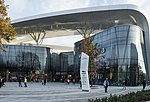Powstańców Śląskich (district)
Districts of WrocławPages with German IPAPages with Polish IPAUse American English from January 2024

Powstańców Śląskich (Polish pronunciation: [pɔfˈstaɲt͡suf ˈɕlɔnskix], German: Neudorf, [ˈnɔʏ̯dɔɐ̯f]), also sometimes referred to as Południe ([pɔˈwudɲɛ]), is a district in Wrocław located in the southern part of the city. It was established in the territory of the former Krzyki district. Originally a village, the settlement was incorporated into Breslau (Wrocław) in 1868.Once a prestigious neighborhood of the city, it was destroyed during the siege of Breslau. Today, it is an site of intense commercial and residential development. It houses the city's tallest skyscraper, the Sky Tower.
Excerpt from the Wikipedia article Powstańców Śląskich (district) (License: CC BY-SA 3.0, Authors, Images).Powstańców Śląskich (district)
Wielka, Wrocław Powstańców Śląskich (Osiedle Powstańców Śląskich)
Geographical coordinates (GPS) Address Nearby Places Show on map
Geographical coordinates (GPS)
| Latitude | Longitude |
|---|---|
| N 51.093333333333 ° | E 17.020277777778 ° |
Address
Wielka
Wielka
53-332 Wrocław, Powstańców Śląskich (Osiedle Powstańców Śląskich)
Lower Silesian Voivodeship, Poland
Open on Google Maps









